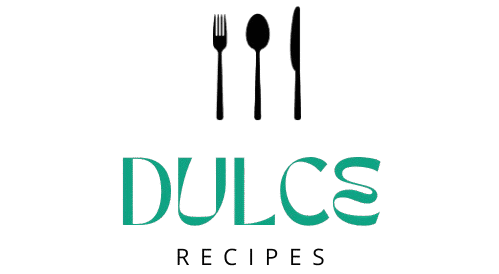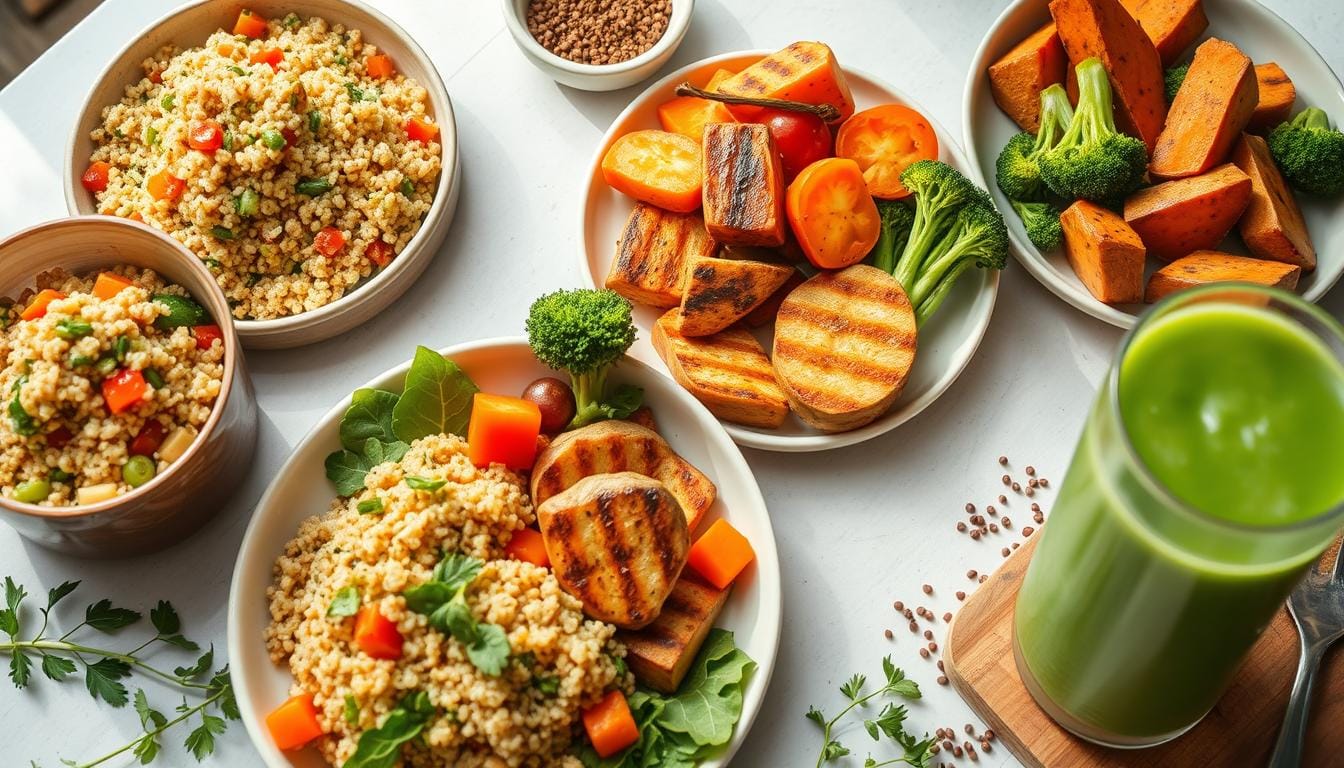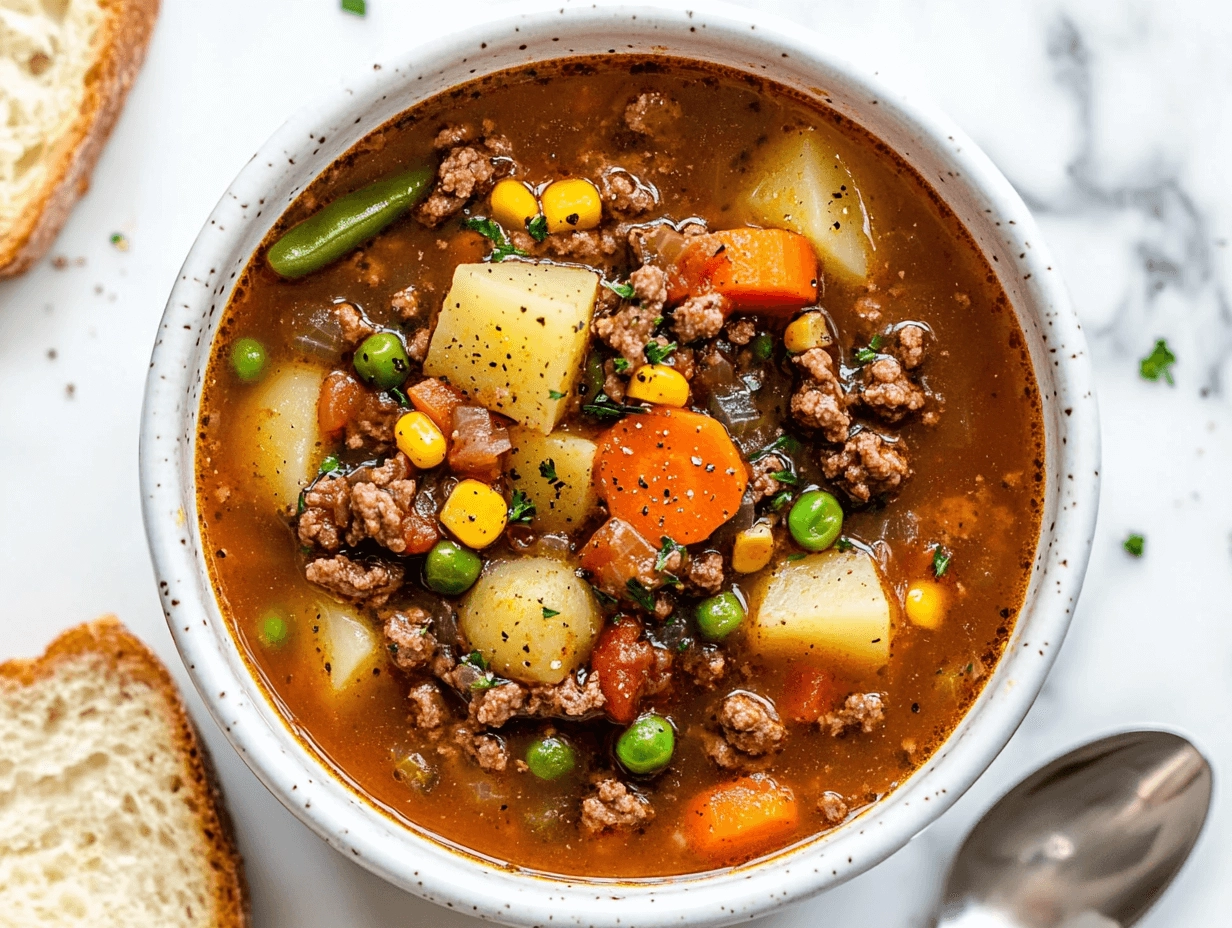Living with Polycystic Ovary Syndrome (PCOS) can feel like navigating a complex health maze. Managing PCOS symptoms can be overwhelming. But, your lunch doesn’t have to be a source of stress. It can be a powerful tool for healing and balance.
PCOS affects about 1 in 10 women worldwide. Finding the right PCOS lunch recipes is key to reclaiming your health. These recipes are made to support your body’s unique needs. They focus on stabilizing hormones and reducing inflammation.
Imagine turning your midday meal into a strategy for managing PCOS symptoms. The right pcos diet recipes can make a big difference. They can help reduce insulin resistance and support your overall wellness.
Table of Contents
Discover more delicious recipes and ideas by visiting our homepage!
Understanding PCOS and Its Impact on Nutrition
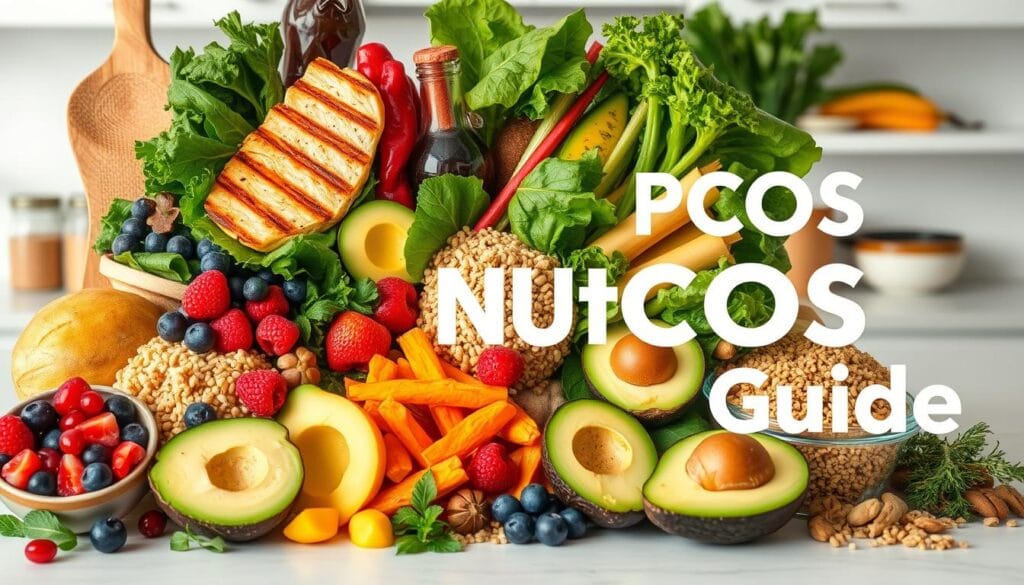
Polycystic Ovary Syndrome (PCOS) affects about 1 in 10 women of childbearing age. It’s a big health issue. Learning how nutrition helps manage symptoms and boosts wellness is key.
Common PCOS Symptoms and Dietary Challenges
Women with PCOS face tough symptoms that diet can affect. These include:
- Irregular menstrual cycles
- Weight gain
- Insulin resistance
- Hormonal imbalances
- Acne and skin issues
The Role of Diet in Managing PCOS
Choosing the right foods can greatly help manage symptoms. Studies show diet can help women with PCOS lose 7-8 kg in 3-6 months. It can also make menstrual cycles normal for over 50% of women.
How Food Affects Hormonal Balance
Your diet affects hormonal balance and insulin sensitivity. Eating PCOS-friendly foods can reduce inflammation and regulate blood sugar. Strategic nutrition can be a powerful tool in managing your PCOS symptoms.
By eating nutrient-rich, balanced meals, you can actively manage your PCOS. This improves your life quality.
Essential Nutrients for PCOS Management
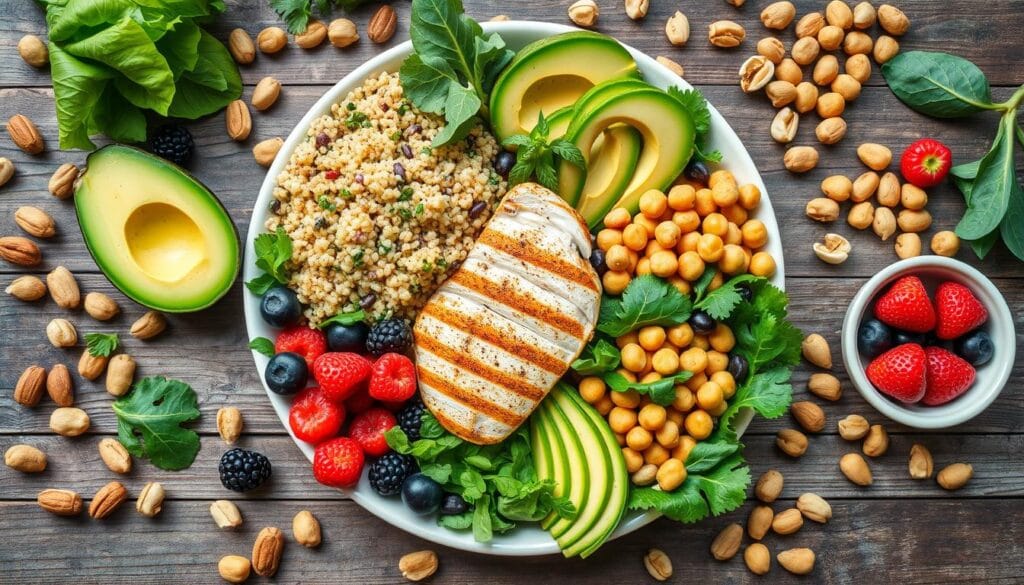
Managing PCOS needs a smart nutrition plan. Your diet is key to balancing hormones and improving health. By choosing the right nutrients, you can make recipes that help with PCOS challenges.
Understanding the right nutrients is key for PCOS management. Women with PCOS often face insulin resistance issues. Studies show they are 2 to 3 times more likely to have this problem.
Critical Nutrients for PCOS
- Low Glycemic Index Carbohydrates: Help stabilize blood sugar levels
- Lean Proteins: Support muscle health and metabolic function
- Healthy Fats: Reduce inflammation and support hormone production
- Fiber: Improve insulin sensitivity and digestive health
When making a low glycemic lunch, pick ingredients that support hormonal balance. Research shows a diet rich in these nutrients can boost insulin sensitivity by up to 30% in women with PCOS.
Nutrient-Rich Food Recommendations
- Omega-3 rich foods (salmon, chia seeds)
- Low GI vegetables and fruits
- Lean protein sources
- Whole grains with low glycemic index
By choosing your meals wisely, you can make recipes that taste good and support your body. Remember, managing PCOS is about feeding your body the right nutrients at the right time.
The Power of Blood Sugar Balancing Meals
Managing PCOS needs a smart nutrition plan. It must balance hormones and improve metabolism. Keeping blood sugar in check is key to managing PCOS symptoms and boosting wellness.
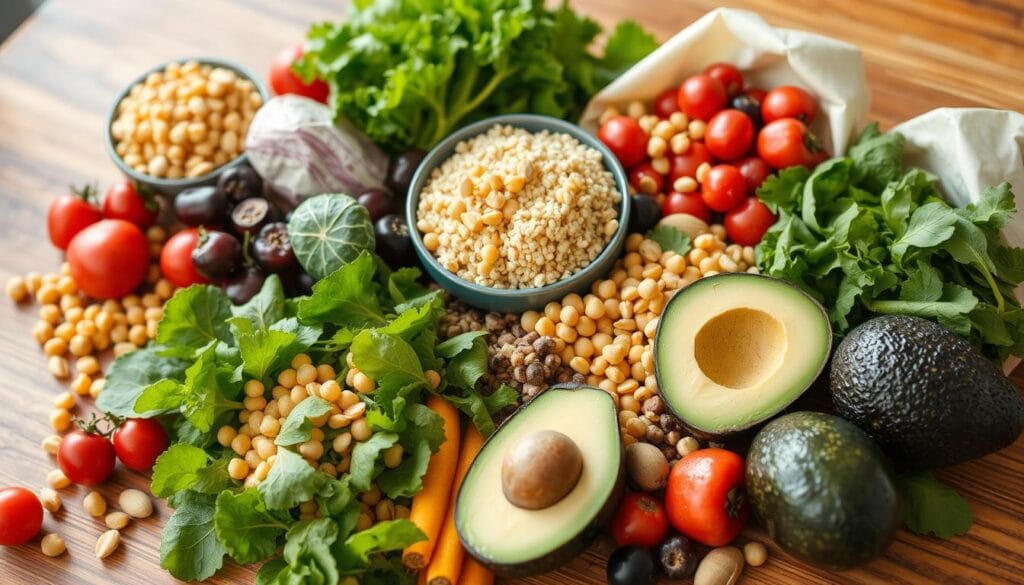
Low Glycemic Food Options
Your anti-inflammatory lunch can be a game-changer for PCOS. Foods with low glycemic index help keep blood sugar steady and fight insulin resistance. They slowly release sugar, avoiding spikes that mess with hormones.
- Quinoa
- Lentils
- Leafy green vegetables
- Berries
- Nuts and seeds
Importance of Protein and Fiber
Creating meals that boost fertility means focusing on protein and fiber. These are vital for:
- Keeping blood sugar stable
- Helping with hormone balance
- Making you feel full
- Boosting digestive health
Timing Your Meals
When you eat matters a lot for managing blood sugar and PCOS. Eat smaller, balanced meals all day to keep energy and hormone levels steady.
| Meal Component | Recommended Serving | Blood Sugar Impact |
|---|---|---|
| Protein | 20-30g per meal | Stabilizes insulin |
| Fiber | 25-30g daily | Slows sugar absorption |
| Healthy Fats | 1-2 servings | Supports hormone production |
By using these tips, you can make healthy meals that help manage PCOS and improve your health.
PCOS Lunch Recipes for Beginners
Finding the right lunch when you have PCOS can be tough. The right pcos lunch recipes can help manage symptoms and keep energy up all day.
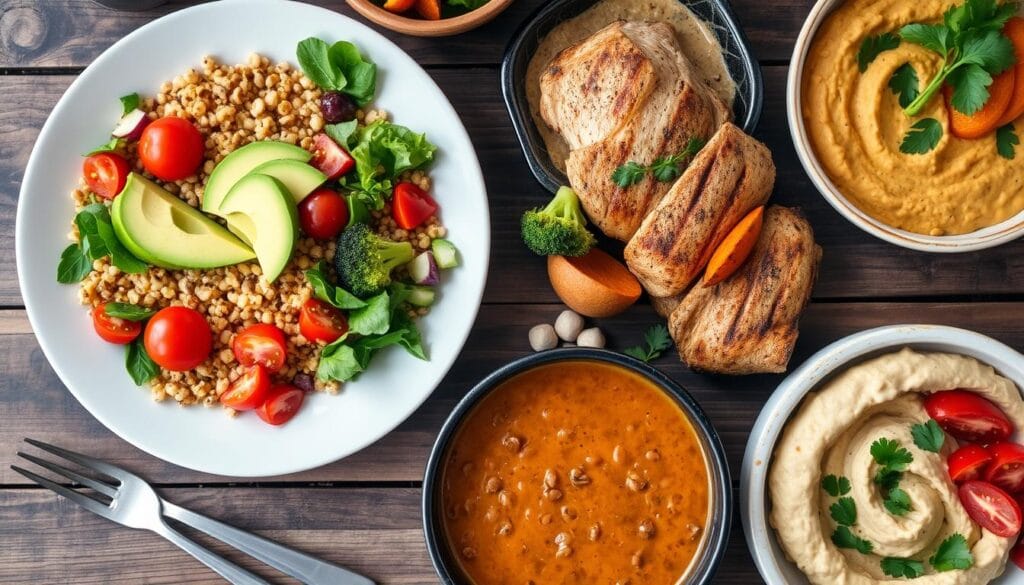
Your PCOS meal ideas should aim for stable blood sugar and lots of nutrients. Here are some easy ways to make tasty, hormone-friendly lunches:
- Prioritize low glycemic index ingredients
- Include lean proteins
- Incorporate healthy fats
- Balance macronutrients
When looking for the best meal plan for pcos, try these nutrient-rich lunch ideas:
- Chickpea and Avocado Salad
- 350 calories per serving
- 10g protein
- Low glycemic impact
- Rich in essential minerals
- Zucchini Chicken Pesto Bowl
- 30g protein
- Low carbohydrate option
- Quick 30-minute preparation
Understanding your body’s nutritional needs is key to great pcos lunch recipes. Each meal should keep blood sugar stable, reduce inflammation, and give you lasting energy.
Meal prepping can make managing PCOS nutrition easier. By setting aside time to prepare balanced lunches, you can cut down on cooking stress. This ensures you get nutritious meals that support your hormonal health every week.
Quick and Easy PCOS-Friendly Lunch Ideas
Managing PCOS through diet doesn’t have to be hard or take a lot of time. Creating a plan for healthy meals can change your daily eating habits. It helps support your health journey.
Making lunch can be easy if you know how to make tasty and healthy recipes for PCOS.
15-Minute Meal Options
When you’re short on time, quick meals are a lifesaver. Here are some fast lunch ideas:
- Grilled chicken salad with mixed greens
- Zucchini noodle bowl with pesto
- Protein-packed quinoa wrap
Are Sandwiches Good for PCOS?
Sandwiches can be good for PCOS if you choose the right ingredients. Look for:
- Whole grain bread
- Lean protein sources
- Healthy fat additions
Make-Ahead Lunch Solutions
| Meal Type | Prep Time | Storage Duration |
|---|---|---|
| Mason Jar Salads | 15 mins | 5 days |
| Protein Boxes | 20 mins | 4 days |
| Grain Bowls | 30 mins | 3-4 days |
No-Cook PCOS Lunches
Quick lunches can be healthy without cooking. Try these:
- Greek yogurt parfait with nuts
- Hummus vegetable plate
- Canned tuna with pre-cut vegetables
Pro tip: Batch preparing ingredients can reduce daily meal prep stress by up to 50% and support your PCOS management strategy.
Anti-Inflammatory Ingredients for PCOS Meals
Managing PCOS needs a smart nutrition plan. Anti-inflammatory lunches are key for hormonal health. You can make tasty meals that also help with PCOS symptoms.
Anti-inflammatory ingredients are essential for PCOS-friendly foods. Studies show that up to 40% of women with PCOS can benefit from an anti-inflammatory diet.
Top Anti-Inflammatory Ingredients for PCOS
- Turmeric: Reduces inflammation and supports hormone balance
- Ginger: Helps combat oxidative stress
- Cinnamon: Supports insulin sensitivity
- Omega-3 rich foods: Can reduce inflammation by up to 30%
Planning your meals can change how you manage PCOS. Adding anti-inflammatory ingredients to your lunch can help control blood sugar and support hormone health.
| Ingredient | Anti-Inflammatory Benefits | PCOS Support |
|---|---|---|
| Salmon | High in Omega-3 | Reduces hormonal imbalances |
| Kale | Rich in antioxidants | Supports blood sugar control |
| Blueberries | Low glycemic index | Combats inflammation |
Your lunch can be a powerful tool in managing PCOS. By choosing anti-inflammatory ingredients, you’re not just eating a meal – you’re supporting your body’s natural healing processes. Try these ingredients to make delicious, nutritious anti-inflammatory lunches that make managing PCOS easier and more enjoyable.
Meal Prep Strategies for PCOS Success
Managing PCOS through meal prep can change your health journey. Good meal planning lets you make consistent, healthy meals. These meals help balance hormones and improve overall health.
Good meal prep needs careful planning. Your meal plan should make nutrition easy and meet your health needs.
Weekly Prep Guide
Having a weekly meal prep plan can lower stress and help manage PCOS. Here are key steps:
- Plan meals 1-2 weeks ahead
- Choose ingredients that are good for you and versatile
- Batch cook proteins
- Prepare pre-cut veggies
Storage Tips and Guidelines
Storing food right keeps your meals fresh and healthy. Follow these tips to keep your meals at their best:
| Food Type | Storage Duration | Recommended Container |
|---|---|---|
| Cooked Proteins | 3-4 days | Airtight glass containers |
| Chopped Vegetables | 4-5 days | Sealed plastic containers |
| Prepared Grains | 5-7 days | Refrigerator-safe containers |
Batch Cooking Methods
Make your meals better with batch cooking. Use tools like:
- Slow cooker
- Instant Pot
- Large sheet pans
- Multiple storage containers
Pro tip: Cook big batches of chicken, quinoa, and roasted veggies. Then, mix and match them all week.
Plant-Based PCOS Lunch Options
Managing PCOS through diet can change your life. Plant-based lunches are great for balancing hormones. Up to 20% of women have PCOS, making good nutrition key.
Plant-based proteins are full of nutrients for PCOS diets. Foods like:
- Lentils – high in protein and fiber
- Chickpeas – stabilize blood sugar levels
- Tofu – provides complete protein
- Quinoa – nutrient-dense grain
- Black beans – support insulin management
Your diet should include balanced meals. Mix plant proteins with complex carbs and healthy fats. Meal composition matters more than strict restrictions.
When looking at PCOS breakfast and lunch, choose foods that:
- Reduce inflammation
- Support insulin sensitivity
- Provide steady energy
- Promote hormonal equilibrium
A good plant-based PCOS lunch is a quinoa bowl with roasted veggies, hummus, and pumpkin seeds. It’s full of protein, fiber, and nutrients, without losing flavor.
Protein-Rich PCOS Lunch Recipes
Managing PCOS through nutrition is key, and meal planning is essential. Protein helps keep blood sugar stable and supports hormonal balance for women with PCOS.
When looking for pcos lunch recipes, choose lean proteins that are good for your metabolism. Women with PCOS often face insulin resistance, making the right protein choices important.
- Lean chicken breast
- Wild-caught salmon
- Tofu and tempeh
- Eggs
- Greek yogurt
- Lentils and beans
When wondering “is lunch meat ok for pcos?”, go for the least processed options. Choose organic, nitrate-free turkey or chicken slices to avoid inflammation.
A balanced PCOS lunch should have about 30 grams of protein, along with complex carbs and healthy fats. This combo can lower blood sugar spikes by up to 50%.
Think about protein-rich meal prep to save time:
- Batch cook grilled chicken
- Prepare quinoa in advance
- Pre-portion canned fish
- Roast tofu cubes
Pro tip: Add anti-inflammatory spices like turmeric to your protein meals. It can reduce inflammation by 20-30%.
Building the Perfect PCOS Lunch Plate
Making the perfect lunch for women with PCOS is more than picking healthy foods. It’s about putting them together in a way that helps balance hormones and manage symptoms. Good pcos meal ideas aim to create a balanced plate that meets nutritional needs and keeps blood sugar steady.
Knowing how much to eat is key to healthy pcos meals. Your lunch plate should have a certain ratio to get the most nutrition and help your metabolism.
Portion Control Guidelines
- Fill half your plate with non-starchy vegetables
- Allocate 1/4 of the plate to lean protein sources
- Use the remaining 1/4 for complex carbohydrates
- Add a small portion of healthy fats
Balanced Meal Components
When planning the best meal for pcos, focus on these important nutrients:
- Protein: Helps keep muscles strong and lowers insulin resistance
- Fiber: Regulates blood sugar and boosts digestive health
- Healthy Fats: Supports hormone production and reduces inflammation
- Complex Carbohydrates: Gives lasting energy without raising insulin too much
Customization Options
Your PCOS lunch plate should be tailored to you. Personalize your meals based on your symptoms, activity level, and nutritional needs. Consider getting help from a nutritionist to make sure you’re getting what you need.
Conclusion
Managing PCOS through diet doesn’t have to be hard. Your lunch recipes can help balance hormones and improve health. By choosing nutrient-rich, hormone-friendly foods, you can nourish your body and control PCOS symptoms.
Understanding your nutritional needs is key to successful PCOS diet recipes. Opt for low-glycemic, anti-inflammatory foods to stabilize blood sugar and reduce insulin resistance. Each meal is a chance to make choices that boost your health.
Your PCOS journey is unique and ever-changing. While these lunch tips are a great start, working with healthcare experts can tailor your diet. Try out the recipes and meal ideas from this guide. Small, consistent changes can make a big difference in managing PCOS.
Your journey to better health starts with every meal. Use nutrition to change your PCOS experience, one delicious lunch at a time.
FAQ
What are the best lunch options for managing PCOS?
For managing PCOS, choose lunches with low glycemic index foods. These help balance blood sugar and hormones. Opt for lean proteins, healthy fats, and complex carbs. Try salmon with roasted veggies, quinoa salad with chicken, or a Mediterranean bowl with Greek yogurt and nuts.
How does diet impact PCOS symptoms?
Diet is key in managing PCOS. It helps regulate insulin, reduce inflammation, and balance hormones. Foods that stabilize blood sugar and provide essential nutrients can improve symptoms like irregular periods and weight gain.
Are sandwiches good for a PCOS-friendly diet?
Sandwiches can be good for PCOS if you choose wisely. Use whole grain bread, lean proteins like turkey or chicken, and add lots of veggies. Avoid processed meats and white bread. Include healthy fats like avocado to manage blood sugar.
What are the key nutrients important for PCOS management?
Important nutrients for PCOS include low glycemic carbs, lean proteins, healthy fats, and fiber. These help stabilize blood sugar, reduce inflammation, and support hormonal balance. Eat foods like leafy greens, fatty fish, nuts, seeds, and whole grains.
Is lunch meat okay for PCOS?
Most processed lunch meats are not good for PCOS due to high sodium and preservatives. Choose nitrate-free options like fresh-roasted turkey or chicken. Better choices include grilled chicken, fish, tofu, or legumes.
How can I prepare quick PCOS-friendly lunches?
Prepare quick lunches like mason jar salads, overnight quinoa bowls, or batch-cooked proteins with veggies. Make extra dinner portions or use slow cookers. Planning ahead helps maintain a PCOS-friendly diet.
What is a good PCOS breakfast?
A good PCOS breakfast should have protein, healthy fats, and complex carbs. Try vegetable omelets, chia seed pudding, Greek yogurt with berries and nuts, or overnight oats with protein powder. These options help stabilize blood sugar and provide energy.
Can plant-based diets help manage PCOS?
Plant-based diets can help manage PCOS. They offer high-fiber, nutrient-dense foods that regulate insulin and reduce inflammation. Focus on whole grains, legumes, veggies, fruits, nuts, and seeds. Consult a nutritionist to ensure you get enough protein and essential nutrients.
